A Comprehensive Guide to Cannabis Supplements: Benefits & Types
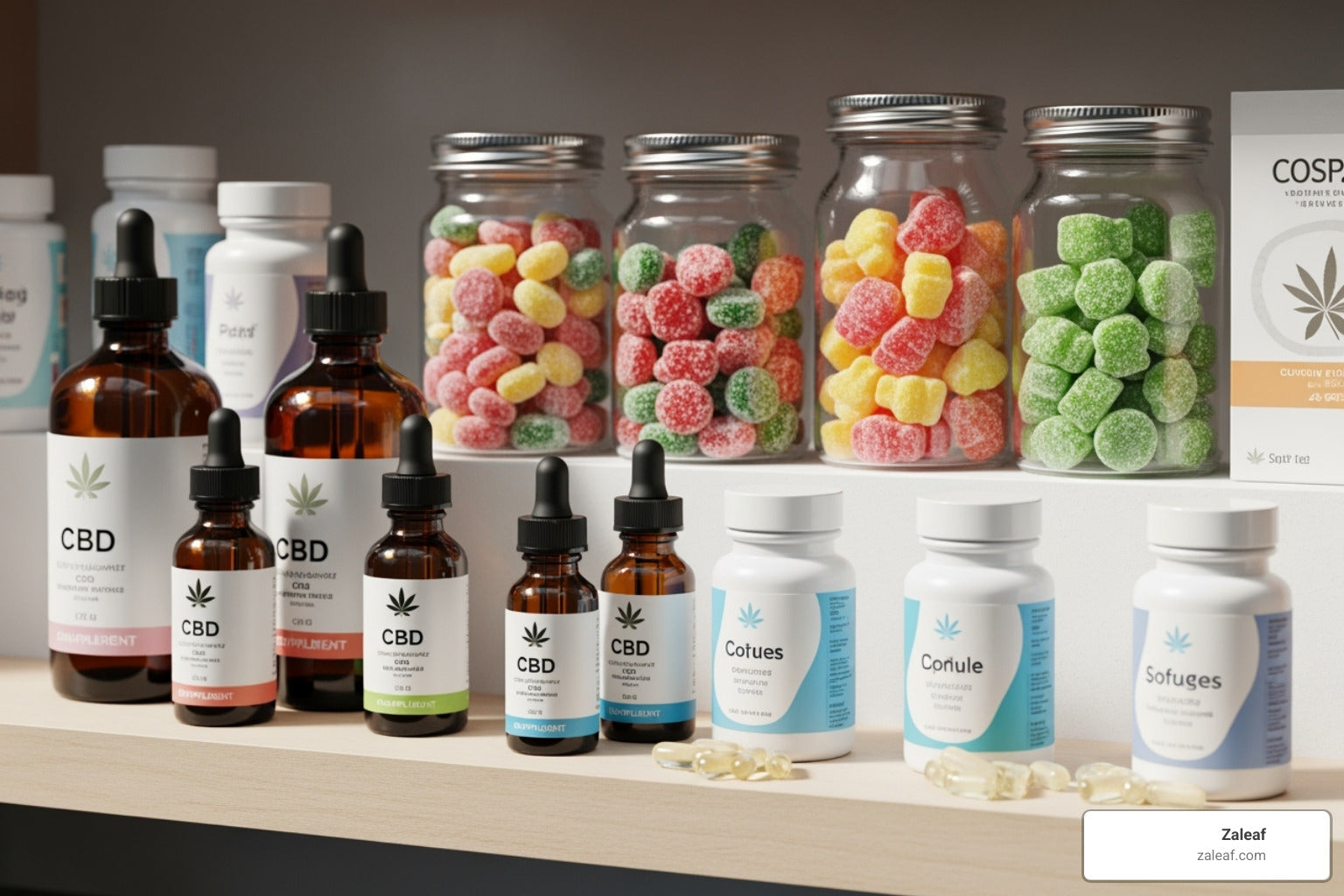
The Rise of Cannabis Supplements: A New Era of Wellness
Cannabis supplements are products derived from hemp that contain cannabinoids like CBD, designed to support wellness without psychoactive effects. Available as oils, gummies, capsules, and topicals, they are primarily used for:
- Pain relief - 55% of users report this as their primary reason
- Anxiety management - Used by 45% of consumers
- Sleep support - Helps 35% of users with sleep issues
- Stress reduction - A natural alternative for daily wellness
- Anti-inflammatory benefits - Supports overall health
The cannabis supplements market is projected to grow from $5.0 billion in 2022 to $15.3 billion by 2028, reflecting a shift toward natural wellness solutions.
These supplements work by interacting with the body's endocannabinoid system (ECS), a network of receptors that helps regulate sleep, mood, pain, and immune function. Cannabinoids bind to these receptors, helping restore balance and promote wellness.
Legal cannabis supplements contain less than 0.3% THC, so they won't cause a "high" or impair daily activities. This makes them ideal for professionals seeking natural stress relief without performance or drug testing concerns.
As Max Shemesh from Zaleaf, I've dedicated my career to the cannabinoid industry, scaling quality cannabis supplements across 300+ stores. My focus is on creating effective cannabis supplements backed by rigorous third-party testing and innovative formulations.
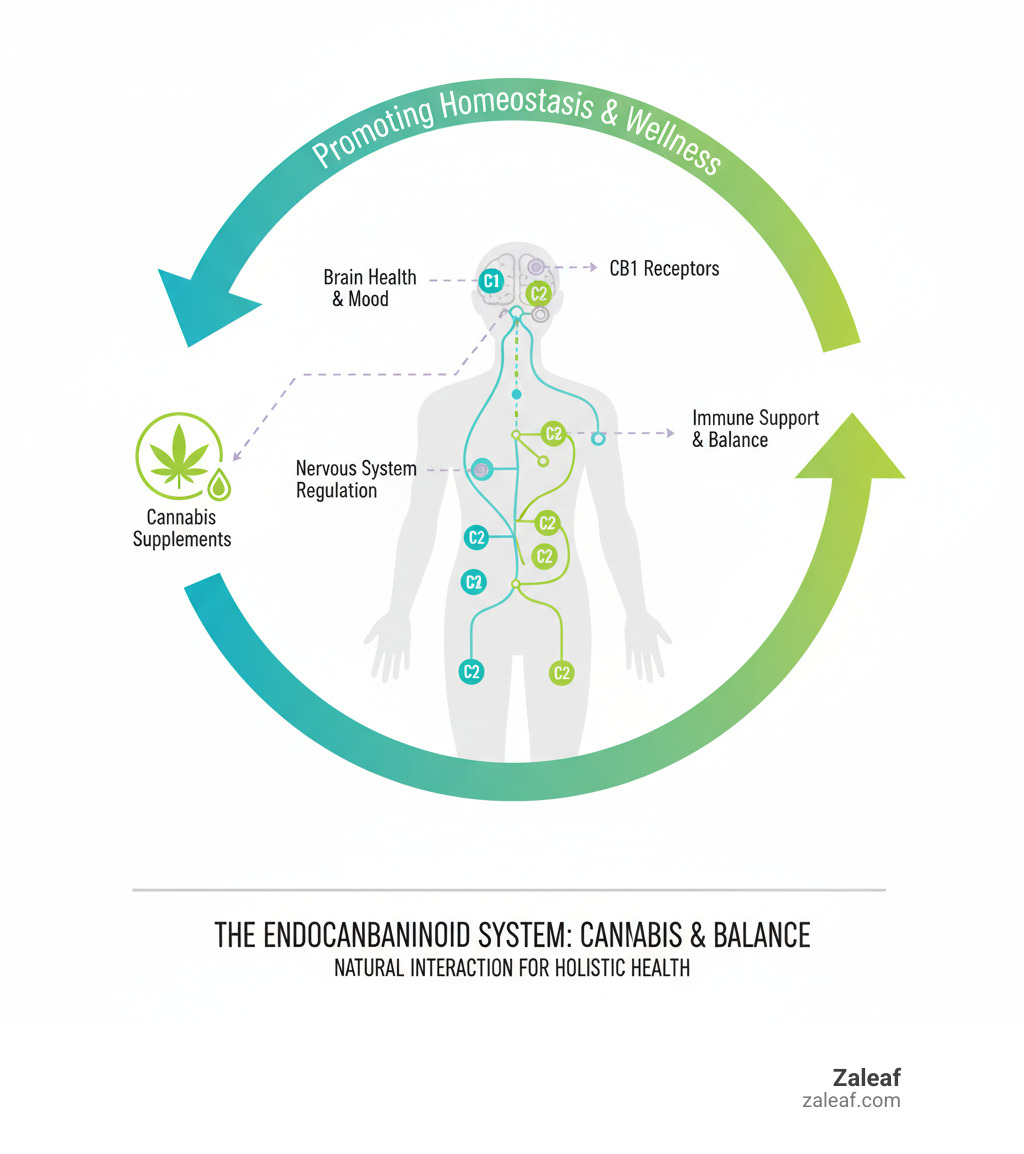
Cannabis 101: Understanding the Basics
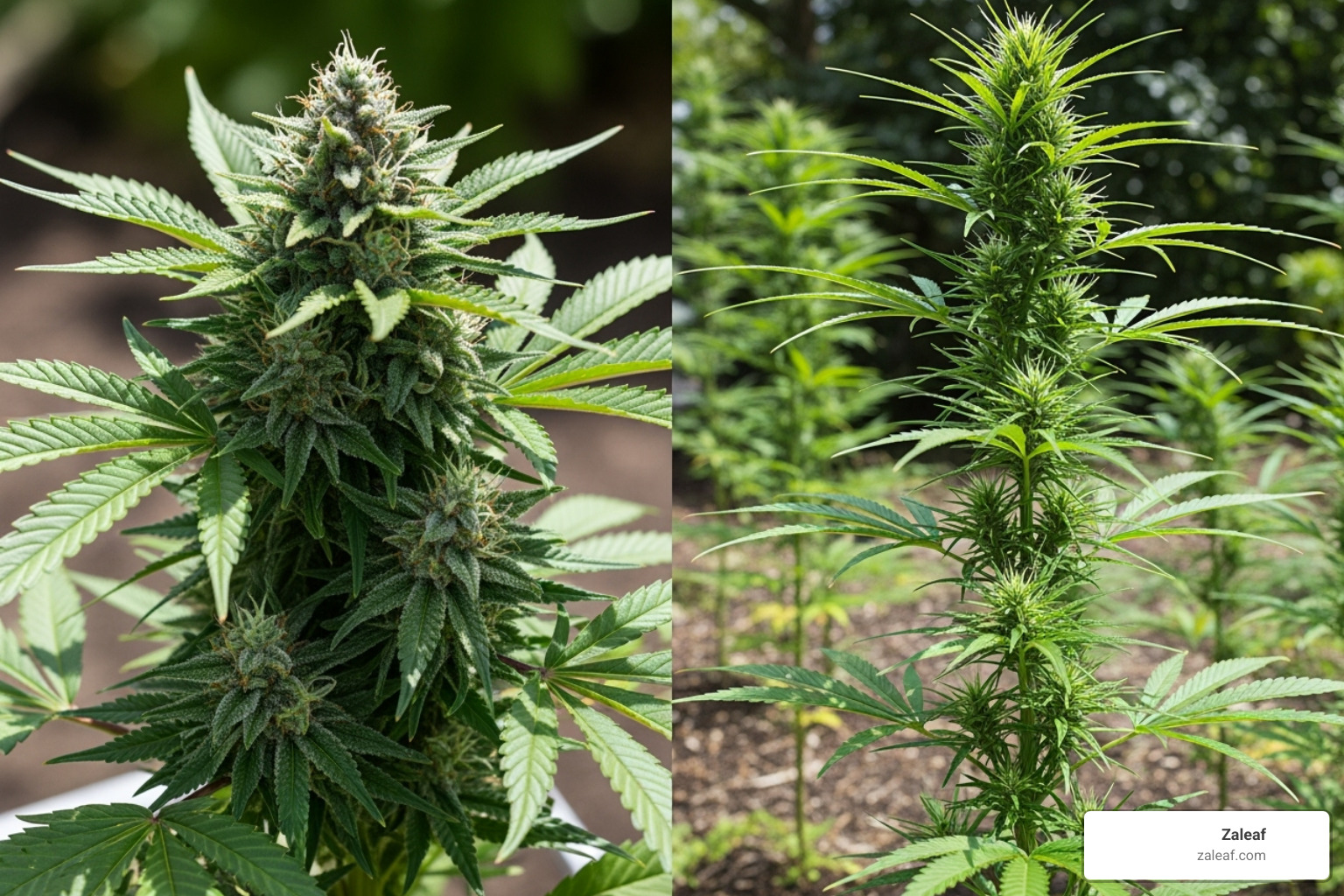
The cannabis plant contains over 400 unique compounds that influence how cannabis supplements affect the body and mind.
The main compounds are cannabinoids, like THC and CBD, which interact with your body's systems. The plant contains over 100 different cannabinoids, each with potential benefits.
Terpenes are aromatic compounds that create the plant's distinctive scents, like pine, citrus, or lavender. They also work with cannabinoids to improve their effects in what's known as the entourage effect.
Flavonoids give cannabis plants their color while providing antioxidant and anti-inflammatory benefits.
These compounds work through your body's Endocannabinoid System (ECS), an internal regulatory system finded in the 1990s. The ECS helps manage everything from sleep and mood to appetite and pain. When you use cannabis supplements, the plant's cannabinoids support your ECS, helping maintain balance.
What is the Difference Between CBD and THC?
While both are cannabinoids, CBD and THC have very different effects.
Cannabidiol (CBD) is non-psychoactive, meaning it won't make you feel "high." It works quietly to help with relaxation, anxiety, and pain management, making it suitable for use anytime without impairment.
Tetrahydrocannabinol (THC) is the compound responsible for cannabis's psychoactive effects. It activates the brain's CB1 receptors, which can alter perception, mood, and appetite, creating the "high" associated with marijuana.
Key differences include psychoactive effects (THC is psychoactive, CBD is not), chemical structure (slight variations change how they interact with the body), and legal status. Hemp-derived CBD with less than 0.3% THC is federally legal, while THC's legality varies by state.
| Property | CBD | THC |
|---|---|---|
| Psychoactive Effects | Non-psychoactive | Psychoactive |
| Legal Status | Federally legal (from hemp) | Varies by state |
| Drug Testing | Unlikely to cause positive test | Will cause positive test |
| Side Effects | Mild (drowsiness, dry mouth) | Can include anxiety, paranoia |
| Medical Benefits | Pain, anxiety, inflammation | Pain, nausea, appetite |
Understanding these differences is key to choosing the right cannabis supplements. For a deeper dive, check out our guide on CBD vs. Delta-8: Exploring the Best of Both Worlds.
Hemp vs. Cannabis: What's the Distinction?
Hemp and marijuana are the same plant species, Cannabis sativa L. The distinction is legal and chemical, based on THC content.
The THC content threshold is the legal dividing line: hemp contains 0.3% THC or less, while anything above that is classified as marijuana.
The 2018 Farm Bill federally legalized hemp and its derivatives, removing them from the Controlled Substances Act and paving the way for the cannabis supplements industry.
Cultivation purpose also differs. Hemp is grown for fiber, seeds, and cannabinoids like CBD, with minimal THC. Marijuana is cultivated for high THC content.
This distinction is crucial. All legal hemp-derived products, including those from Zaleaf, must contain less than 0.3% THC, ensuring you get the benefits without legal issues or unwanted psychoactive effects.
Full-Spectrum, Broad-Spectrum, and Isolate
When shopping for cannabis supplements, you'll see three main types:
Full-spectrum products contain all compounds naturally found in the hemp plant: CBD, minor cannabinoids (CBN, CBG), terpenes, flavonoids, and trace amounts of THC (under 0.3%). This allows for the maximum entourage effect.
Broad-spectrum products include all the same compounds but have the THC completely removed. You still get the entourage effect without any THC.
CBD isolate is 99% pure CBD, with no other cannabinoids, terpenes, or THC. It's ideal for those who want to avoid THC entirely or are sensitive to other plant compounds.
The entourage effect is the concept that cannabis compounds work better together, creating synergistic benefits. The combined effect is greater than the sum of the individual parts. At Zaleaf, we focus on full-spectrum products to maximize these beneficial interactions. Learn more in our article on Stress Less: How Full Spectrum Vape Pens Can Help.
Exploring the Spectrum: Types and Potential Benefits of Cannabis Supplements
Cannabis supplements come in a wide variety of forms to fit any lifestyle. Oils/tinctures lead the market at 60% of purchases, followed by edibles (40%) and topicals (30%).
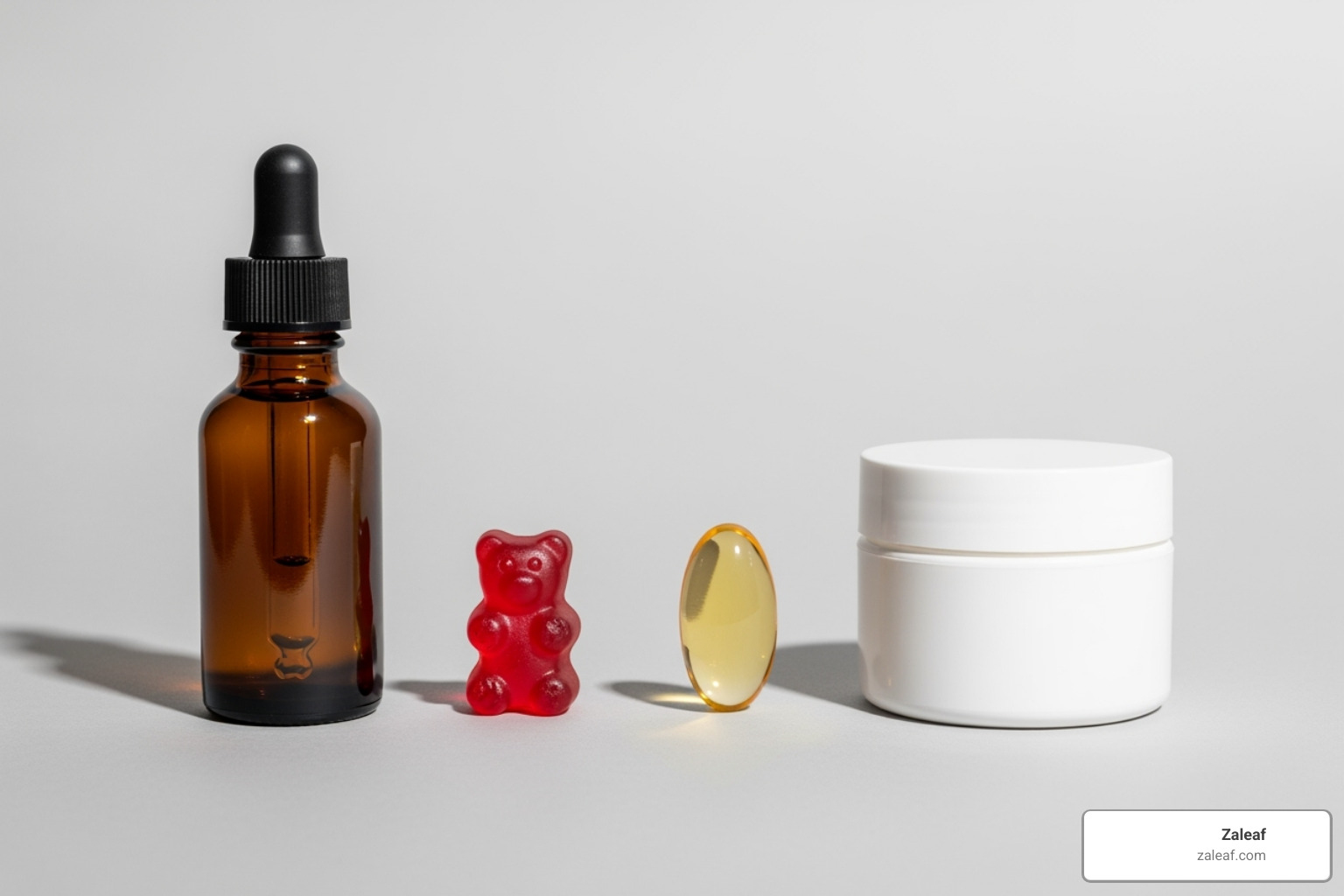
Common Forms of CBD Products
Oils and tinctures are liquid extracts offering flexible dosing. Taken under the tongue for fast absorption or mixed into food and drinks, the dropper allows for precise dose adjustments.
Softgels and capsules provide a simple, consistent, pre-measured dose, fitting easily into any supplement routine.
Gummies and edibles make wellness enjoyable and tasty. They take longer to take effect as they pass through the digestive system, but the effects often last longer. Learn more in THC Gummies Explained: Everything You Need to Know.
Topicals and balms are applied directly to the skin for targeted, localized relief of soreness or skin issues without entering the bloodstream.
Vapes offer the fastest onset of effects, as cannabinoids are absorbed directly through the lungs. For more, see The Ultimate Guide to Cannabis Vape Carts: From THC to CBD.
Potential Health and Wellness Benefits
People turn to cannabis supplements for many reasons. Pain relief is the top reason for 55% of users. Our guide on Soothe Your Aches: Best Cannabis Edibles for Pain Relief explores this use.
Anxiety and stress reduction is a goal for 45% of users, who find CBD helps them manage daily challenges with more calm.
Sleep quality improvement is a benefit for 35% of users. Cannabis supplements can promote relaxation and address issues that disrupt rest.
Other potential benefits include anti-inflammatory effects, which support overall health, and emerging research into neuroprotective properties for brain health.
While these benefits are widely reported, the FDA has only approved one prescription CBD drug. This lack of regulation for over-the-counter supplements makes rigorous third-party testing, which we require for all our products, essential.
Targeted Formulations for Specific Needs
A key innovation is targeted formulations for specific wellness goals.
Sleep-focused products often combine CBD with melatonin to help regulate the sleep-wake cycle. Our guide Sweet Dreams: A Guide to Cannabis Edibles for Sleep explains how these work.
Stress-management formulations may include adaptogens like ashwagandha, which helps the body adapt to stress, creating a powerful partnership with CBD.
Pain-focused products can incorporate other botanical extracts to provide more comprehensive relief through the entourage effect.
At Zaleaf, we specialize in crafting formulations with improved cannabinoid and terpene profiles to support your specific wellness goals.
Safe and Smart Usage: Dosage, Quality, and Potential Risks
Starting with cannabis supplements can be rewarding, but it requires a knowledgeable and cautious approach. Responsible use involves understanding dosage, quality, and potential risks.
How to Choose the Right CBD Potency
Choosing the right CBD potency is a personal process. We recommend the "start low and go slow" method.
Ideal dosage depends on:
- Your body weight and metabolism
- The condition you're addressing
- Your individual sensitivity
Always check the label for milligrams (mg) per serving for precise dosing. For example, a 30ml bottle with 1000mg of CBD contains about 33mg per 1ml dropper.
Start with a low dose (5-10mg) for a few days to observe the effects. If needed, increase by 5mg every few days until you feel benefits. Consistency is important, as effects can build over time. For more on dosing, see our guide on Dose Like a Pro: Mastering THC Gummies Dosage for Beginners.
What to Look for in High-Quality Cannabis Supplements
Because the FDA does not heavily regulate cannabis supplements, quality varies. A study found many CBD products were mislabeled. To ensure you get a high-quality product, look for:
- Third-party lab testing: This is non-negotiable. Independent labs verify cannabinoid content and screen for contaminants like pesticides, heavy metals, and mold.
- Certificate of Analysis (COA): This lab report should be easily accessible on the brand's website or via a QR code. It confirms CBD/THC levels and purity. Learn more in The Ins and Outs of Third-Party Lab Testing.
- Extraction methods: CO2 extraction is the gold standard, yielding a pure extract without harsh solvents.
- Hemp source: Look for products made from organically grown U.S. hemp, which is subject to strict agricultural guidelines.
- Product purity: The COA confirms the absence of unwanted contaminants.
Prioritizing these factors ensures you're buying safe and effective cannabis supplements.
Potential Side Effects and Medication Interactions
Cannabis supplements are generally well-tolerated but can have side effects and interact with medications. Always consult a healthcare professional before starting any new supplement.
Common side effects of CBD can include:
- Dry mouth
- Diarrhea
- Reduced appetite
- Drowsiness
- Fatigue
Negative side effects are uncommon and may resolve by reducing the dose.
A more significant concern is drug interactions. CBD can inhibit the liver enzyme (CYP450) that metabolizes many drugs. This can increase the levels of other medications in your system, raising the risk of side effects.
Key interactions to be aware of include:
- Blood thinners: CBD can increase the effects of drugs like warfarin, raising bleeding risk.
- Sedatives and CNS depressants: Combining CBD with sedatives can lead to increased drowsiness and slowed breathing.
- Other medications: CBD can interact with antidepressants, anti-seizure drugs, and more. For details on potential drug interactions, consult your healthcare provider or a trusted medical information resource.
We strongly urge you to talk to your doctor before using cannabis supplements, especially if you have underlying health conditions or take prescription medications. For a safety overview, see our article Cannabis Edibles: Are They Safe or Bad for You?.
The Legal Landscape and Future of Cannabis Wellness
The journey of cannabis supplements to a mainstream wellness option has been shaped by evolving legal frameworks. Understanding this landscape is key to making informed choices.
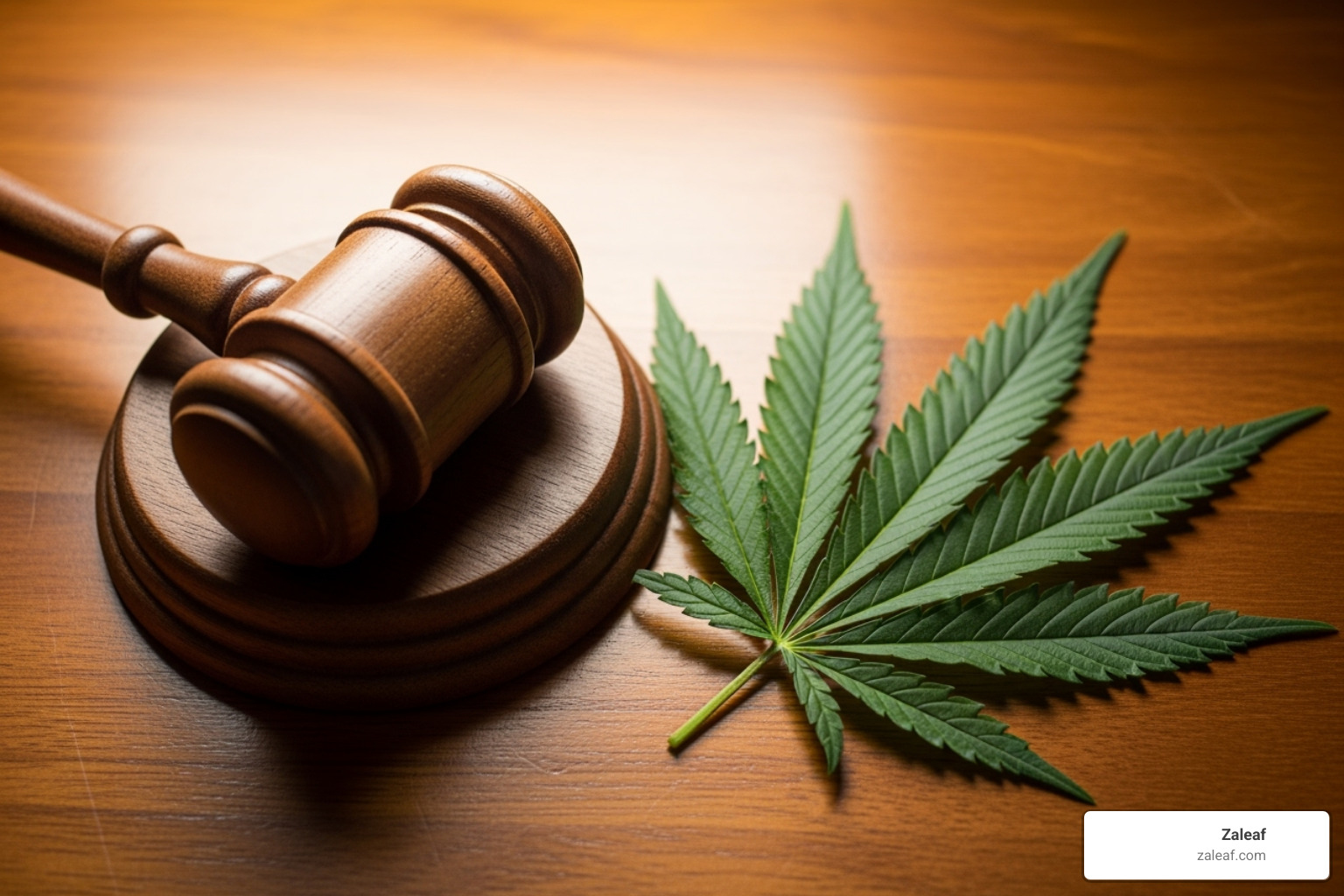
Navigating the Legal Regulations of Cannabis Supplements
The legal status of cannabis supplements can seem complex, but it's based on a few key principles.
The 2018 Farm Bill was a landmark law that federally legalized hemp by defining it as cannabis with less than 0.3% delta-9 THC. This removed hemp and its derivatives, like CBD, from the Controlled Substances Act, allowing for the widespread sale of hemp-derived cannabis supplements like those from Zaleaf.
However, a patchwork of federal and state laws exists. While hemp is federally legal, states can still regulate or prohibit certain hemp products. Always check your local regulations.
The FDA's stance on CBD is cautious. It has not approved over-the-counter CBD products as dietary supplements, focusing enforcement on products with unsubstantiated health claims. You can find current information on the FDA's official page on cannabis product regulation.
This creates unregulated market risks. Since the FDA doesn't heavily regulate the market, product quality varies. That's why Zaleaf voluntarily adheres to the highest standards, including rigorous third-party testing for every product.
Emerging Research and Future Uses
Research into cannabis supplements is rapidly advancing, shaping the future of wellness.
Studies on mental health are a promising frontier, with preliminary findings on CBD's potential for anxiety and depression. Researchers are also exploring its role in managing conditions like Parkinson's disease and PTSD.
Research into other cannabinoids like Cannabigerol (CBG) and Cannabinol (CBN) is revealing new possibilities. CBG is being studied for anti-inflammatory properties, while CBN is gaining attention for potential sedative effects.
As our understanding of the endocannabinoid system grows, so does the potential for new therapeutic applications for chronic diseases and neurological conditions.
The most exciting development may be the future of personalized cannabis medicine, with formulations custom to an individual's genetic makeup. At Zaleaf, we are already pioneering this by enhancing cannabinoid and terpene profiles for targeted mood effects.
The global cannabis market is projected to reach $130.1 billion by 2030, reflecting growing acceptance and fueling further innovation.
Frequently Asked Questions About Cannabis Supplements
It's natural to have questions when exploring cannabis supplements. We're here to provide clear answers.
Will cannabis supplements make me feel "high"?
No, hemp-derived cannabis supplements are not designed to make you feel "high." By federal law, these products must contain less than 0.3% delta-9 THC, the compound that causes marijuana's intoxicating effects.
CBD products provide non-psychoactive benefits, such as a sense of calm or relaxation, without the euphoric "high" of THC. At Zaleaf, we focus on products that deliver wellness benefits without unwanted psychoactivity.
How long does it take for CBD supplements to work?
The time it takes for cannabis supplements to work varies by product type and individual factors.
-
Product type:
- Oils and tinctures (sublingual): Effects are often felt within 15-45 minutes as cannabinoids absorb directly into the bloodstream.
- Gummies and edibles: Effects can take 30 minutes to 2 hours as they must pass through the digestive system. The effects also tend to last longer. Learn more in our guide: Edible Expectations: When Will Your Cannabis Snack Kick In?.
- Topicals: Applied to the skin, they often start working within 10-20 minutes for localized relief.
- Vapes: Offer the fastest onset, often within minutes.
- Other factors: Your metabolism, the dosage, and whether you've eaten can also influence onset time.
Many users find that the benefits of cannabis supplements become more consistent with regular, daily use.
Can I fail a drug test from using CBD products?
This is a valid concern, and the risk depends on the product type. Most standard drug tests screen for THC.
- Full-spectrum products: These contain trace amounts of THC (less than 0.3%). While not enough to cause a high, consistent use could potentially lead to a positive test result.
- Broad-spectrum and CBD isolate products: These are processed to remove all detectable THC, significantly lowering the risk of a positive test. However, mislabeling or cross-contamination is a slight possibility in an unregulated market.
To minimize risk:
- Choose broad-spectrum or CBD isolate products if drug testing is a concern.
- Insist on third-party tested products from reputable brands like Zaleaf. Check the Certificate of Analysis (COA) to verify it is "non-detectable THC."
- Understand your company's drug policies.
For more details, our article Will Delta-8 Show Up? Your Guide to D8 and Drug Screening offers valuable insights. While Zaleaf products are 100% legal, we advise caution regarding drug tests.
Starting on Your Cannabis Wellness Journey
Understanding cannabis supplements is the first step on your wellness journey. This knowledge empowers you to make informed decisions that serve your needs.
These supplements work with your body's endocannabinoid system to help restore balance. Whether you're seeking relief from stress, discomfort, or sleep issues, knowing the difference between product types like full-spectrum, broad-spectrum, and isolate puts you in control.
The versatility of cannabis supplements is one of their greatest strengths. From oils and gummies to topicals, there is a form to fit every lifestyle, and many people are finding natural relief for their wellness concerns.
Most importantly, quality is non-negotiable. Insist on third-party lab testing and a clear Certificate of Analysis to ensure what's on the label is in the product. Remember to start with a low dose and consult your healthcare provider, especially if you take other medications.
At Zaleaf, we provide 100% legal, third-party tested cannabis supplements you can trust. We specialize in enhancing cannabinoid and terpene profiles for mood-specific effects. With fast, discreet shipping and no ID or medical card required, we make it easy to access better wellness.
Your journey with cannabis supplements is unique. We're here to support you every step of the way. To learn more about how these compounds can support your daily life, explore our comprehensive guide: Cannabis for Wellness: Exploring its Role in Relaxation, Pain, and Stress Management.
Here's to finding what balance feels like for you – naturally, safely, and with confidence.

